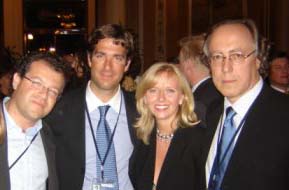|
|

| October 16, 2006 Alison Kulach, '99, Witnesses Latin American Financial News in the Making According to one of her friends, Alison Kulach, ’99, gets paid to jet around the globe and hobnob with some of the world’s top financial gurus over three-hour gourmet meals. Although admitting that she plays hard, Kulach said she also works hard, sometimes facilitating meetings on international trade and finance into the early morning hours. LatinFinance, a magazine which covers cross-border finance and investment in Latin America and the Caribbean, hired Kulach in May 2003 to launch what has become the magazine’s highly successful events-planning business. LatinFinance’s events business has increased 500 percent during Kulach’s tenure, currently generating almost three million dollars in annual revenue. The Miami-based magazine now earns three times as much from events planning as it does from advertising. Kulach got into events planning in a roundabout way. After graduating in 1999 with triple majors in leadership studies, Spanish and international studies with a concentration in Latin American studies, she joined Merrill Lynch’s Boston office where she worked in U.S. equity markets. Kulach moved to Merrill Lynch’s New York office in 2000 and focused on the Latin American markets. But by fall 2002, many Latin American markets showed signs of distress, and Merrill Lynch began to lay off employees. Fearful for her job, Kulach decided to leave Merrill Lynch and took a position trading distressed Latin American corporate credits for a small distressed-debt firm. She had held that position for several months when she received the offer from LatinFinance. LatinFinance had just decided to get into event planning and charged Kulach with developing and implementing events targeted at chief executive officers, chief financial officers, commercial bank presidents and senior government officials, such as ministers of finance and central bank presidents. Kulach responded by creating leadership councils—small, elite groups whose members could discuss in confidence some of the major financial challenges and issues facing Latin America. “I would invite members of particular groups, such as bank presidents or government officials, to participate in a leadership council where they could talk about the issues of greatest concern to them, such as ethics, developments in the global capital markets and best practices,” Kulach said. “They discussed how they were expressing leadership in their companies and their governments, and they learned from each other.” Her experience in the Latin American division at Merrill Lynch and her Wall Street contacts helped her identify interesting, relevant topics for the various leadership councils and conferences she planned, Kulach said. Ultimately some leadership councils generated story ideas for LatinFinance. For example, Kulach used her position to highlight the opportunities for financing available to Argentine companies after the financial crisis of 2001-02 closed the door to the international capital markets for the country’s most dynamic companies. Working closely with the Argentine government, she created the Cumbre Financiera Argentina (Argentine Financial Summit), first held during the summer of 2004 in Buenos Aires. At the summit, senior corporate executives connected with international investors and financiers to determine the best path of re-entry into the global markets. The event proved a tremendous success and has assumed a permanent place on the calendars of the Argentine business elite during the last three years, helping to fuel a renewed interest in investment in Argentina. LatinFinance based its July 2006 cover story largely on this year’s summit and the related developments in the Argentine financial markets. Kulach benefited from the success of the event as well when LatinFinance asked her to manage the entire events business and promoted her to Director of Conferences and Special Events in July 2006. Recently as she prepared to leave for Singapore to attend the annual International Monetary Fund and World Bank meetings where she would be mediating a discussion between top Latin American and Asian financial experts, Kulach recalled her initial interview with LatinFinance. The interviewer understood the relevance of her international studies major, her fluency in Spanish and her familiarity with Latin American financial markets gained from her work at Merrill Lynch. But he expressed some concern that Kulach hadn’t taken any business courses. “I explained that a leadership studies major is a business major without the numbers,” Kulach said. “It focuses on the bigger picture. He was impressed by my answer and the unique skill set I could bring to the organization. And he got really excited when I cited statistics on the Duke basketball team. He offered me the job.” Kulach attests to the continued relevance of her leadership studies degree in her daily work. “I work with senior executives and senior members of government and often reflect on their leadership styles,” Kulach said. “Some of them are so dynamic that they should be Jepson case studies. Personally, I would like to see Jepson incorporate more of an international focus in the leadership studies courses, as we all operate in a global context today.” |
